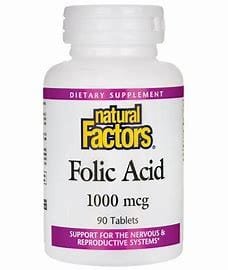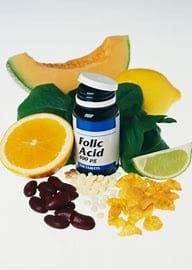Introduction
Folic acid is an exceptionally significant water-soluble vitamin, also referred to as Vitamin B9 or folate. It has many important functions in the body in carrying out various operations of DNA synthesis, cell division, and the development of red blood cells. The type of this vitamin used in supplements and enriched foods is the synthetic form, which occurs naturally in foods like leafy greens, legumes, and citrus fruits. Thus, it is essential for women who are pregnant as well as persons who are at increased risk of suffering from a folic acid deficiency to appreciate the importance of folic acid, its medical use, and its potential risks and benefits.

Folic acid is the synthetic form of folate, which is the natural appearance of Vitamin B9. Folate was derived from the Latin word “folium,” meaning leaf, because it occurs abundantly in green leafy vegetables. Folic acid, on the other hand, is produced synthetically and used in dietary supplements and food fortification programs since it has higher bioavailability compared to naturally occurring folate.
Natural Sources of Folate:
Dark green leafy vegetables (spinach and kale)
Legumes such as lentil beans and chickpeas
Citrus fruits like oranges and lemons
Avocados
Fortified cereals and bread
Synthetic Sources of Folic Acid:
Prenatal Vitamins and Multivitamins
Fortified foods like breakfast cereals, pasta, and rice
Mechanism of Action
In the human body, ingested folic acid is converted to tetrahydrofolate (THF), its active form, which acts as the precursor for the synthesis of nucleotides. Nucleotides comprise DNA, and their synthesis has a high demand during most periods of rapid growth like pregnancy, infancy, and adolescence. In addition, folic acid supports the synthesis of red and white blood cells by bone marrow, thereby ensuring proper oxygen transport and immune function.
Uses of Folic Acid
Folic acid is commonly prescribed for preventing and treating deficiency in folate and also its conditions, but its therapeutic uses extend further than that. Below are some of the major uses:
1. Prevention of Neural Tube Defects (NTDs)
One of its most critical applications is the prevention of neural tube defects, or NTDs, for newborns. Congenital disabilities of the brain and spine that develop when the neural tube does not close properly during the fetal development phase are classified as NTDs. The neural tube includes the brain and spinal cord. Pregnant women take 400-800 micrograms (mcg) of folic acid every day before conception and during the early stages of pregnancy to prevent these defects.
2. Treatment of Anemia
It can also cause megaloblastic anemia, which is characterized by the formation of large and immature red blood cells in the bone marrow. A person suffering from this condition can become short of breath, weak, and easily fatigued. Folic acid supplements can treat this condition by ensuring healthy red blood cell production.
3. Cardiovascular Health
Folic acid also reduces the risk of cardiovascular diseases. It is possible to decrease homocysteine levels since it is an amino acid that may have blood linked to heart problems. High levels of homocysteine cause one to be more prone to having strokes, heart attacks, and other related cardiovascular conditions. Supplements for folic acid combined with vitamins B6 and B12 lessen the levels of homocysteine.
4. Prevention of Cancer
Even though research in this field is still ongoing, some studies have shown that the risk of certain cancers, especially colorectal cancer, can be reduced through the intake of folic acid. Folic acid plays an important role in the repair and synthesis of DNA, which saves the cell from becoming malignant. On the other hand, some studies have revealed that in some people, excessive intake of high dosages of folic acid may serve as a potential risk for cancer, thus underscoring the need to follow the right dosage.
5. Mental Wellness
Another function of folic acid may be the enhancement of brain function and protection from cognitive impairment in elderly people. Research suggests that low folate levels increase the risk for dementia and Alzheimer’s disease. Supplementation may improve memory and cognition abilities, though more research would need to be conducted to confirm such findings.
Benefits and Advantages of Folic Acid
Folic acid supplementation has lots of health benefits, especially to groups or populations with specific needs, such as pregnant women and people with certain medical conditions.

1. Prevents birth defects
This is the most significant benefit provided by folic acid: it prevents NTDs from developing in the fetus. Public education regarding folic acid supplementation has also helped decrease the incidence of these birth defects in several countries.
2. Relieves anemia symptoms
Supplements promptly enhance the conditions of patients with folic acid deficiency anemia, including fatigue, weakness, and paleness, due to the increase in healthy red blood cells.
3. Benefits the Health of the Heart
Folic Acid Lowers the Homocysteine Levels. Cardiovascular disorders such as heart attacks and strokes are also decreased by folic acid.
4. Promotes Healthy Skin and Hair
Folic Acid is essential to the body for forming new cells, and this function will help to develop an individual with great skin and further promote their hair growth, among other benefits. Even reports exist about preventing hair loss due to supplementation.
Some Cons and Side Effects
As safe as folic acid might be, far too much supplementation or misuse could trigger potential side effects as well as health risks.
1. Masking Vitamin B12 Deficiency
Another great concern over excessive folic acid consumption is masking vitamin B12 deficiency symptoms. Although deficiency in both causes megaloblastic anemia, one supplement as folic acid cures the anemia without identifying the cause, thus allowing for irreversible nerve damage.
2. Cancer Risk
The risk of health associated with high levels of folic acid remains controversial until now. A few studies prove that a higher consumption, especially supplemented from foods and substances with it fortified, may induce proliferation in cancer-developing stages, especially in colon cancer.
3. Gastrointestinal Disorders
Other patients may exhibit side effects that are very light and may include nausea, bloating, or a bitter taste after using oral folic acid. Most of these symptoms occur very rarely and are not harmful.
4. Interaction with other drugs
Folic acid sometimes clashes with other drugs such as methotrexate; this is used for treating some types of cancer or autoimmune disease, and some drugs are used for epilepsy to control seizures. The prescription drugs may be necessary for you to put into consideration before introducing a folic acid supplement.
Conclusion:

Folic acid is a nutrient that is vital for human health and life, especially for a pregnant woman and even other people with health issues. It plays an important role in preventing birth defects, maintaining cardiovascular health, and alleviating symptoms from folic acid deficiency anemia. However, it is imperative to be cognizant of the risk from overconsumption, as an enormous amount of consumption can hide vitamin B12 deficiency, and excessive intake of this vitamin has been correlated with the developing risk of cancer.
Like all other supplements, dosages should be followed to their prescribed level and a health care provider consulted if need be for safe and effective use.



